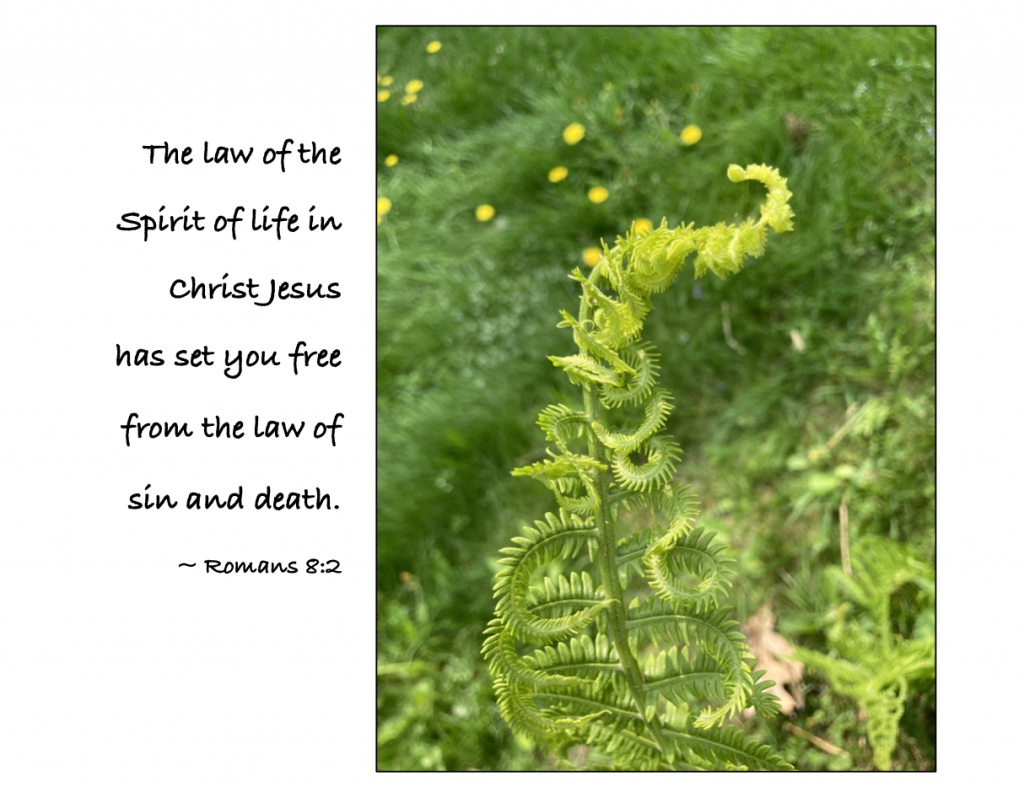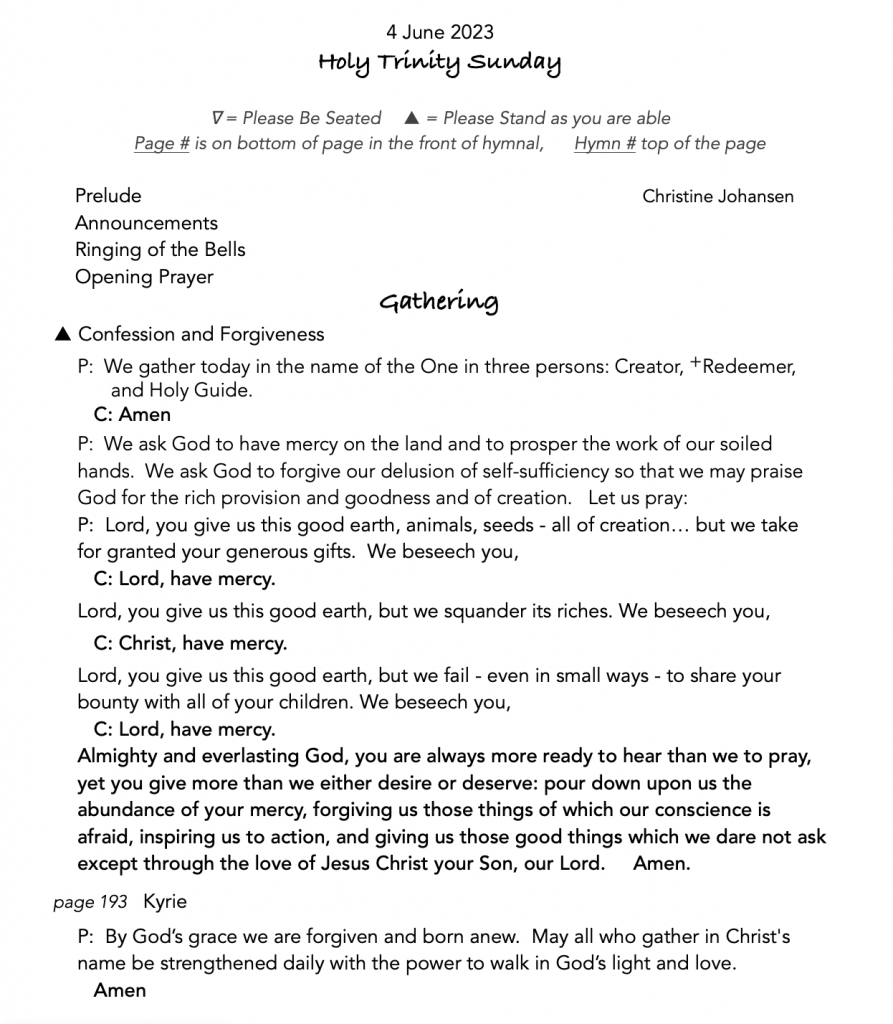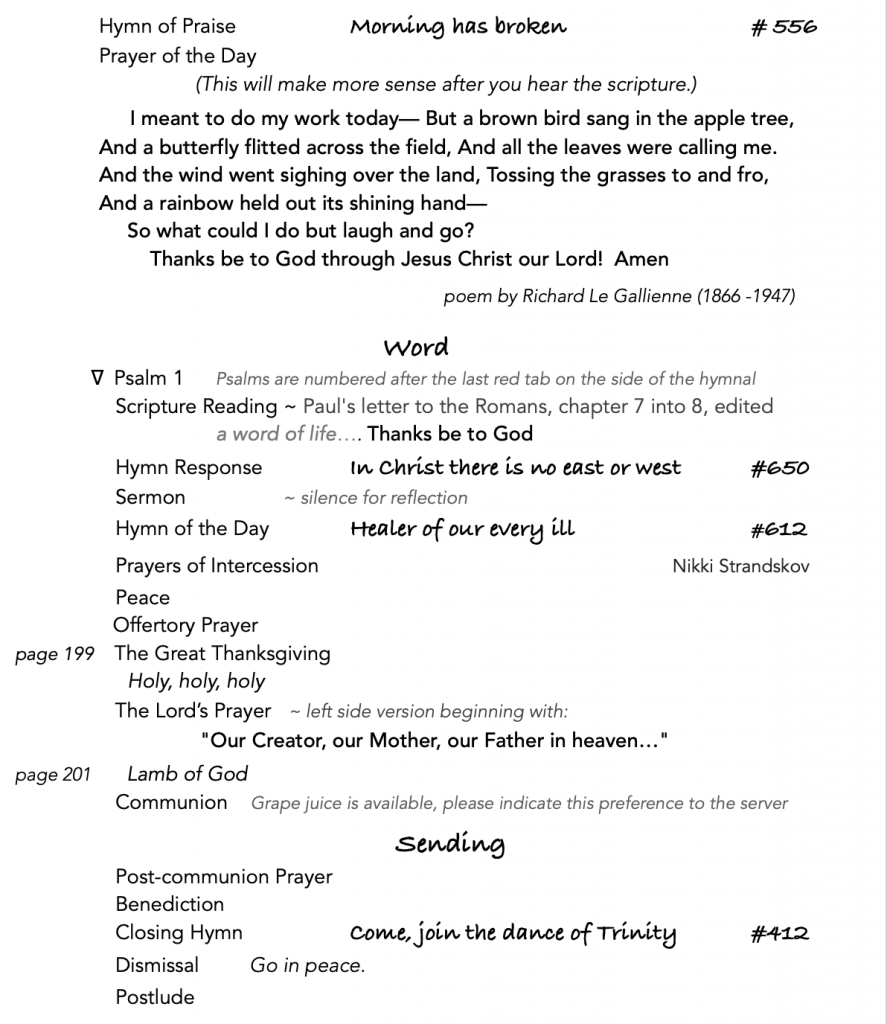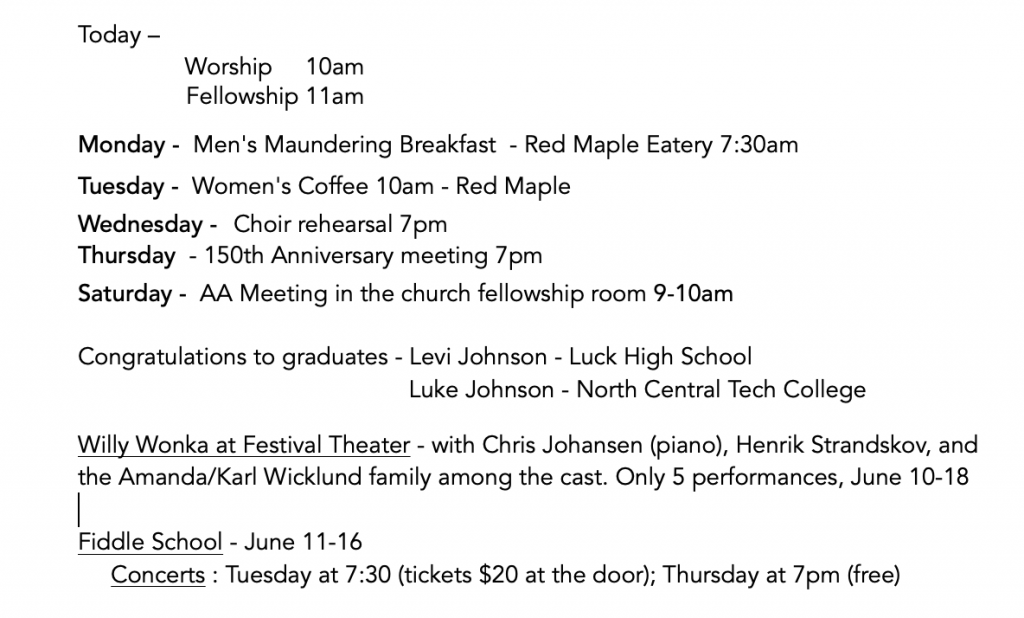Audio Recording



Romans 7
Do you not know, brothers and sisters—for I am speaking to those who know the law—that the law is binding on a person only during that person’s lifetime? 2Thus a married woman is bound by the law to her husband as long as he lives; but if her husband dies, she is discharged from the law concerning the husband.… 4In the same way, my friends, you have died to the law through the body of Christ, so that you may belong to another, to him who has been raised from the dead in order that we may bear fruit for God…. 6Now we are discharged from the law, dead to that which held us captive, so that we are slaves not under the old written code but in the new life of the Spirit.
7What then should we say? That the law is sin? By no means! If it had not been for the law, I would not have known sin. I would not have known what it is to covet if the law had not said, “You shall not covet.” 8But sin, seizing an opportunity in the commandment, produced in me all kinds of covetousness. Apart from the law sin lies dead…. 12So the law is holy, and the commandment is holy and just and good. 13Did what is good, then, bring death to me? By no means! It was sin, working death in me through what is good, in order that sin might be shown to be sin, and through the commandment might become sinful beyond measure.
14For we know that the law is spiritual; but I am of the flesh, sold into sin. 15I do not understand my own actions. For I do not do what I want, but I do the very thing I hate… 18… I can will what is right, but I cannot do it. 19For I do not do the good I want, but the evil I do not want is what I do. 20Now if I do what I do not want, it is no longer I that do it, but sin that dwells within me. 21So I find it to be a law that when I want to do what is good, evil lies close at hand. 22For I delight in the law of God in my inmost self, 23but I see in my members another law at war with the law of my mind, making me captive … 24Wretched man that I am! Who will rescue me from this body of death? 25Thanks be to God through Jesus Christ our Lord! … 8:1 There is therefore now no condemnation for those who are in Christ Jesus. 2For the law of the Spirit of life in Christ Jesus has set you free from the law of sin and of death. 3For God has done what the law, weakened by the flesh, could not do: … 4so that the just requirement of the law might be fulfilled in us, who walk not according to the flesh but according to the Spirit.
14For all who are led by the Spirit of God are children of God. 15For you did not receive a spirit of slavery to fall back into fear, but you have received a spirit of adoption. When we cry, ‘Abba! Father!’ 16it is that very Spirit bearing witness with our spirit that we are children of God, 17and if children, then heirs, heirs of God and joint heirs with Christ….
So far in this study of Romans, we have looked at God’s righteousness that has claimed us despite God knowing we are incapable of following in that right pathway. God has a long history with humans, and even the Israelite people chosen for special attention, to live into his love and guidance couldn’t stop being human and living according to human nature. It is from the faithfulness and mercy of God we receive peace with God. That was week two. Week three was about being instruments of righteousness. By opening ourselves to God’s goodness, we not only experience forgiveness and hope, but we begin a journey where that love produces love in us, and through us for others. As instruments of grace we live into the world of God’s power over Death so that every tool is re-calibrated, put to its good and proper and valued work. Last week touched on the idea of the in-between. The Messianic age has begun, but it has not yet come. Paul and the gospel writers thought it would, that it was just around the corner. 2000 years later, we are still living in the in-between, in the Age of the Spirit who was sent to guide and encourage us.
Paul’s letters are all about how to live. He’s working out the answers to his own questions in this letter to the Romans. What does it mean to believe in God who raised Jesus, but has not yet fulfilled the promises? What difference did / does Jesus’ resurrection make to daily life? This is an ongoing, difficult question.
Chapter 7 of Romans picks up one significant question to chew on. What about the Law, what about Torah? Paul was a Pharisee. That’s important to remember. He loved and trusted in the Law. He and Peter, particularly, had different understandings and agendas since they came from such different backgrounds. But the Holy Spirit worked on each of them and they came to agree that gentiles did not have to first become Torah observant in order to be followers of the Way. Circumcision – that marker of Jewish identity – was not necessary. That was a huge accommodation. Food laws were relaxed. The law was not given up, but stretched, maybe, to allow a new inclusion in the community of belief. Not because the law wasn’t good, but because it became a stumbling block for non-Jews. This shift in emphasis was a new way to love the neighbor.
Paul, in good rhetorical style is arguing multiple sides of the question in these chapters. Are we to sin more so that grace abounds? Not at all! Is the Law sin? Of course not, “the law is holy, and the commandment is holy and just and good,” he writes. Jesus himself said he did not come to abolish the law, but to fulfill it. But what do we do about the Law in light of Christ’s resurrection? What has changed?
What changed is that Paul came to the startling realization that Sin had worked its way into the Law; Sin had corrupted what God intended to bring life. That while the Law was still a gift of God, in the way of the world it had become an agent of Sin and Death, incapable of saving. As Sin, with a capital S is more than the things we do, but is a pervasive, corrosive power, so Law in Paul’s use is more than Torah. Law refers to the structures of reality. Law refers to our human condition in which we cannot seem to do or be the good we choose.
1500 years after Paul wrestled with this, Martin Luther felt the same struggle, condemned by the law. He couldn’t find a way to free himself from the dilemma Paul describes of willing one thing and doing another. Luther writes about this a lot, but one insight came from these chapters in defining the uses of the Law. He felt there were two, possibly three.
The Law’s first function is physical – to promote safety and health and beneficial, peaceful relationships of trust with your neighbor. It works through our actions and communal, societal mores.
The second use works on our conscience showing us our inability to disentangle ourselves from Sin –“If it had not been for the law,” Paul says, “I would not have known sin. I would not have known what it is to covet if the law had not said, “You shall not covet.” We know how this works, how sneaky our minds can be. “You can have anything to eat except the brownies on top of the refrigerator – or the fruit from the tree in the center of the garden.” And suddenly, an intense craving for gooey chocolate brownies slips into your thoughts. You can have anything else to eat – but that’s the only thing you want to eat. And you want it a lot.
The law reveals the failure of our will and a battle begins. “15I do not understand my own actions,” Paul complains. “For I do not do what I want, but I do the very thing I hate… I can will what is right, but I cannot do it. The brownie just found it’s way into my mouth!”
This second use of the Law is supposed to send us running to God for forgiveness, consolation, and repentance. But, chances are the brownies aren’t going to last until morning.
That is obviously a silly example, but you know what I mean. The same internal dynamic works at all depths of significance. Our will, our conscience, our lusts, our needs, our values, our better selves are always taking sides against one another. Who can authentically say, “No, the law (whatever the law may be) says I shall not, and so I shall not.” I mean, ‘you shall not kill’ seems like something we can manage, but our actions, our inactions, our co-opted agency go out like ripples from a stone thrown into the lake and make it impossible to know the ways and times we have killed. We are complicit in harm we never intend.
So, we confess each week before we worship. And perhaps you, too, have an on-going conversation with God about the things we do and don’t do and want to do and feel compelled to do and are complicit in doing. That prayer conversation is the second use of the law. We turn to God hoping for help and comfort.
The third use of the Law is the Holy Spirit’s use in teaching us how to live according to the law and will of God. How to live into the grace and freedom we have received through Jesus’ resurrection as the Christ, the anointed one of God.
This is where today’s reading began. “4In the same way, my friends, you have died to the law through the body of Christ, so that you may belong to another, you may belong to the one who has been raised from the dead in order that we may bear fruit for God…. 6Now we are discharged from the law, dead to that which held us captive, so that we are slaves not under the old written code but in the new life of the Spirit.”
The law still functions. The law is still good and useful and necessary. The law still constricts and convicts, and we have an advocate in God’s Spirit to help us live within the law, and to live in freedom from the law in this in-between time.
Stop signs are still important. Gravity and other natural laws are still in force. Loving your neighbor as yourself is still commanded. Looking for God in the face of your enemy, or of one you would dismiss, or of another species – is still praise and worship of God. The Law of God is good and holy. The laws of society are mostly good, yet always in need of critique according to our best understanding of God’s will for all life to flourish. The thing about law, in civic or society terms, is that what benefits one may very well cause harm to another. Earthly systems are so entwined.
Paul’s discussion acknowledges that, and is also moving beyond that system hooking into the divine realm where the only law is love. Because of the once and for all nature of Christ, we have somehow made a transfer of existence and identity, from one “Lord” over us to another, from one mode of existence to another, still accountable to the law but transferred into the greater law of pure love by the Spirit where God has repaired the breach that Sin had opened up.
How then are we to live? As best as you can, trusting that being in the Spirit brings you, truly, into the love and mercy of God. What about all the fear and guilt and tortured consciences?
We are not free of sin, this is it’s realm – but, at the very same time, we have the love of God proven through Christ and gifted to all people which cannot be taken from us. We live as citizens of two realms in the in-between. Do not neglect the beauty of this realm, nor fear condemnation in the next. Live at peace.
